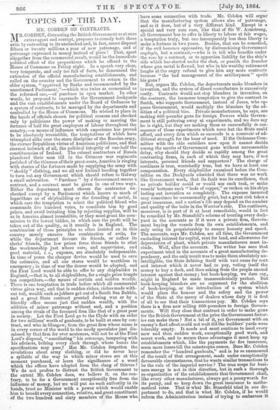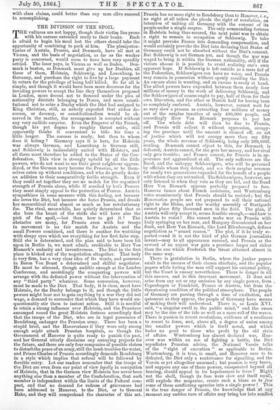TOPICS OF THE DAY.
MR. COBDEN ON CONTRACTS.
MR. COBDEN, distrusting the British Government as at once extravagant and corrupt, proposes to remedy both those evils by entrusting to its unchecked and, in fact, secret disposal fifteen or twenty millions a year of new patronage, and of patronage expressed in money instead of place ! That, apart altogether from the commercial result, would be the immediate political effect of the propositions which he offered to the House of Commons on Friday night. In a speech very clear, very temperate, and only too full of facts, he denounced the extension of the official manufacturing establishments, and called on the country and the Government to return to the older system, "approved by Burke and recommended by the unreformed Parliament,"—which was twice as economical as the reformed one,—of purchase in open market. In other words, ho proposed to supersede the Government dockyards and the vast establishments under the Board of Ordnance by a system of contracts, to be managed by the departments and controlled by the House of Commons. He wished to place in the hands of officials chosen for political reasons and checked only by politicians the power of making or marring the fortunes of half the great employers of labour throughout the country,—a means of influence which experience has proved to be absolutely irresistible, the temptations of which have triumphed alike over the stern discipline of the Russian army, the sterner Republican virtue of American politicians, and that sternest bulwark of all, the political integrity of one-half the constituencies of Ireland. The colonel contractors of Russia plundered their men till in the Crimean war regiments perished of the thinness of their great-coats, America is ringing with stories of the fortunes made by supplying the army with " shoddy " clothing, and we all saw Ireland banding together to turn out any Government which should refuse to Galway a small subvention. " Purchase " by a: Government means a contract, and a contract must be given in one of two ways. Either the department must choose the contractor un- checked except by a Parliament which knows as much of logarithms as of shipbuilding or the founding of metal, in which case the temptation to select the political friend who commands five hundred votes, to conciliate him by good prices, and avoid irritating him by rejecting supplies, will be as in America almost irresistible, or they must grant the com- mission to the lowest bidder, in which case the profit will be taken out of the quality, as it usually is in England. The combination of those principles so often insisted on in this country merely ensures the combination of evils, for while the department favours its friends, or rather its clerks' friends, the low prices force those friends to stint the workmanship just where care, and supervision, and good material, i. e., expense, are absolutely indispensable. In time of peace the cheaper device would be used to save the estimates, and all our stores would- be worthless in emergency ; in time of war the dearer would be adopted, and the First Lord would be able to offer to any shipbuilder in England,—that is, to all shipbuilders, for a single prize tempts ten competitors,—the means of certain and sudden wealth. There is one temptation in trade before which all commercial virtue gives way, and that is sudden riches, riches made with- out toil, wealth such as jobbers get out of a South Sea Bubble, and a great State contract granted during war or by a friendly office means just that sudden wealth, with the addition of minor patronage without end, and a position among the rivals of the favoured firm like that of a great peer in society. Let the First Lord go to the Clyde with an order for two millions' worth of gunboats, to be built at once by con- tract, and who in Glasgow, from the great firm whose name is in every corner of the world to the needy speculator just dis- missed by that firm for over acuteness, will not be at the First Lord's disposal, " conciliating" his entourage, tampering with his advisers, bribing every clerk through whose hands the specifications may pass) Has Mr. Cobden forgotten the revelations about army clothing, or did he never hear a syllable of the way in which minor stores are at this moment purchased, or learn the significance of a word which the offices have adopted from the slang of thieves ? We do not profess to distrust the British Government to the extent. Mr. Cobden does, we believe it, on the con- trary, to be for a Government exceptionally free from the influence of money, but we will put no such authority in its tends, trust no Minister with a power which would enable him to benefit every connection, relative, and great constituent of the two hundred and sixty members of the House who have some connection with trade. Mr. Cobden will argue that the manufacturing system allows also of patronage, and so it does, but of a very different kind. Except in a special and very rare case, like that of Sir W. Armstrong, all Government has to offer is liberty to labour at fair wages, a temptation truly, but one incomparably less than liberty to make a fortune in two years. Besides, that can be remedied, if the evil becomes oppressive, by disfranchising Government employis, but a contract,s--who is to tell who benefits under the rose by a contract, or to apportion liability for the ship's side which has started under the shot, or punish the founder whose gun metal is flawed, but who in his wealthy retirement laughs at the angry refusal to give him any more contracts because " the bad management of the artillerymen " spoilt his guns ?
But, argues Mr. Cobden, the departments make blunders in invention, and the system of direct manufacture is excessively costly. Contracts would not stop blunders in invention, on the contrary, the immense temptation to give the contract to Smith, who supports Government, instead of Jones' who op- poses Government, would multiply the blunders by the ad- dition of a political bias. Private manufacturers, he says, are making 600-pounder guns for foreign Powers while Govern- ment is still pottering away at experiments, and we dare say he is right, but they are making them so successfully in con- sequence of those experiments which none but the State could afford, and every firm which so succeeds is a reservoir of ad- ditional strength for the hour of need. If the Ordnance Com- mittee with the able outsiders now upon it cannot decide among the merits of Government guns without unreasonable delay, why should they decide so rapidly among the great contracting firms, in each of which they may have, if not interests, personal friends and supporters ? The charge of costliness is true, wretchedly true, but we have at least one compensation. Every shipbuilder examined before the Com- mittee on the Dockyards admitted that there was no work like Government work, that its fault was its excellence, that no private builder could or would use such teak, or make vessels' bottoms such " beds of copper," or reckon on his ships lasting out invention so completely. The expense incurred may sometimes be unreasonably great, but a great risk takes a great insurance, and a nation's life may depend on the number and quality of the bolts in the Warrior's side. The costliness, moreover, is in part of it at least remediable, would in fact be remedied by Mr. Stansfeld's scheme of treating every dock- yard in the accounts as if it were a private firm, Govern- ment buying the vessels from its own establishments, and only using its proprietorship to ensure honesty and speed. The accounts, says Mr. Cobden, are all false, the Government excluding interest for capital, rent for land, and allowances for depreciation of plant, which private manufacturers must in- clude. Well, alter the accounts. The writer has seen that experiment tried in the accounts of a great manufacturing de- pendency, and the only result was to make them absolutely un- intelligible, the State debiting itself with vast sums for rent and interest which it, never had to pay, voting itself the money to buy a dock, and then asking from the people annual interest against that money; but book-keeping, we dare say, might in England be made transcendentally perfect. But book-keeping blunders are no argument for the abolition of book-keeping, or the introduction of a system which would place the honour and the safety and the power of the State at the mercy of dealers whose duty it is first of all to see that their transactions pay. Mr. Cobden says there is a firm now selling 600-pounders to foreign Govern- ments. Will they close that contract in order to make guns for the British Government at the price the Government factor- ies can make them ? Not a bit of it, yet Government with an enemy's fleet afloatcould not wait till the builders' yards were tolerably empty. It needs and must continue to need every now and then sudden work, exceptionally good work, and secret work, and to secure those advantages it must keep up establishments which, like the payments for fire insurance, seem mere losses till the catastrophe comes. Does Mr. Cobden remember the "hundred gunboats," and is he so enamoured of the result of that arrangement, made under exceptionally favourable circumstances, that he wants similar transactions to be the rule of the imperial service ? The true scope for busi- ness energy is not in this direction, but in such a thorough re-organization of the establishments that Government shall, like every other manufacturer, always get a pennyworth for its penny, and so keep down the great insurance to mathe- matical rates. That is what Mr. Stansfeld tried in one de- partment to do, and that is what Mr. Cobden, if he would reform the Administration instead of trying to embarrass it with class claims, could better than any man alive succeed in accomplishing.































 Previous page
Previous page